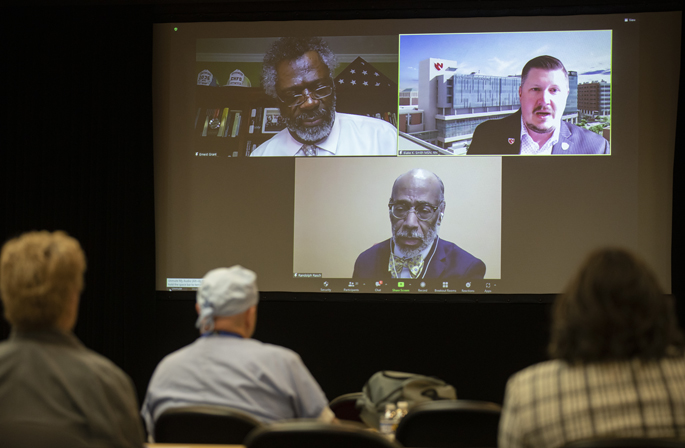
Nurses from throughout Vanderbilt University Medical Center came together recently online and in person at Monroe Carell Jr. Children’s Hospital at Vanderbilt for the Men in Nursing panel discussion.
The discussion, presented by the Vanderbilt Nursing Diversity, Equity and Inclusion Committee in collaboration with Vanderbilt University School of Nursing, virtually featured three male nurse experts who talked about the challenges and opportunities for men in nursing, and the importance of recruiting them. Male nurses make up only about 10% of all nurses nationwide, and men of color make up a fraction of that.
“The nursing profession is currently experiencing a severe shortage of nurses,” said Mamie Williams, PhD, MPH, MSN, APRN, senior director of Nursing Diversity and Inclusion at VUMC and an organizer of the event. “To tackle this issue, it is essential to reach out to historically underrepresented groups, including racial and ethnic minorities and men, and make them aware that nursing offers equal opportunities for all.”
The panel included two Black nurses — Ernest Grant, interim vice dean for Diversity, Equity and Inclusion at Duke University School of Nursing and immediate past president of the American Nurses Association; and Randolph Rasch, PhD, RN, former dean of the College of Nursing at Michigan State University. They were joined by Blake Smith, MSN, RN, immediate past president of the American Association for Men in Nursing.
Grant offered some of the key lessons he has learned as a mentor to attract more men to the nursing field, such as encouraging men to stand up for themselves as nursing equals and not be pigeonholed by their colleagues into stereotypical roles, such as lifting and moving patients.
Men are “taking the same courses. You’re doing the same things in the labs,” he said. “Preparing young men both mentally and physically (for) the challenges that they’re going to encounter is one of the best things.”
Rasch added that nurses must do a better job of making men aware when they are young that nursing is a career option to build a pipeline of male nurses. “I think each of us has the opportunity to do that,” he said.
Smith noted that many men who are now nurses missed their first and true calling to be a nurse and became nurses as second careers.
The recent Supreme Court decision overturning affirmative action may impact the number of men who are admitted into nursing schools and could be seen by some men as a deterrent, Grant noted. Rasch added that the decision is “terribly disappointing” but “I think it’s an opportunity to be more thoughtful about admissions and more thoughtful about how we evaluate people.”
As Smith put it, “the workforce has to reflect the community.” As a man, he believes he can connect with some patients in a way others can’t. “It makes us all better,” he said.
Ultimately, it’s a bottom-line issue, he said. Having a diverse workforce improves the quality of nursing care and improves outcomes for patients.
Mentorship is “everything” in recruiting more men, Smith said. He said his mentors are people he could go to when he had a question about how to respond to a scenario. Grant added that nurses need mentors both in the workplace and out, someone who can be called after a scenario occurs. “Things may happen in the work environment that you can’t really address right away,” he said. “Sometimes it takes the effort that you have to go home or go somewhere and digest it a little bit first, and then … reach out to your mentor.”
In her introductory remarks, Executive Chief Nursing Officer Marilyn Dubree, MSN, RN, NE-BC, talked about the importance of men in nursing.
“We are honored to be an organization that is aspiring and striving to be inclusive of all people,” she said. “Not only tonight, but nights and days going forward, we want to not only honor the men who are in nursing at Vanderbilt but to create an environment where we learn from one another.”












